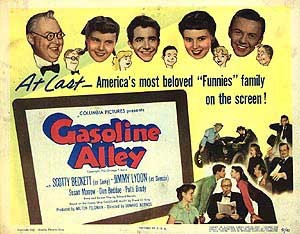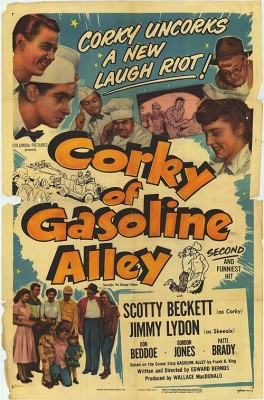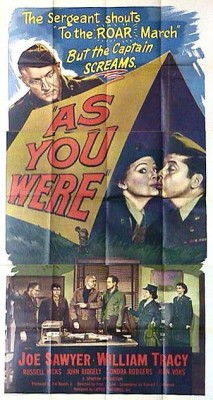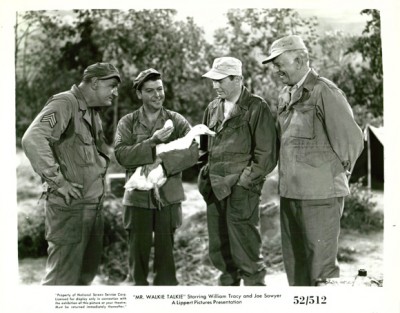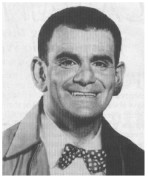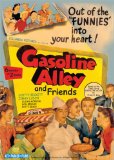| Reviews & Columns |
|
Reviews DVD TV on DVD Blu-ray 4K UHD International DVDs In Theaters Reviews by Studio Video Games Features Collector Series DVDs Easter Egg Database Interviews DVD Talk Radio Feature Articles Columns Anime Talk DVD Savant Horror DVDs The M.O.D. Squad Art House HD Talk Silent DVD
|
DVD Talk Forum |
|
|
| Resources |
|
DVD Price Search Customer Service #'s RCE Info Links |
|
Columns
|
|
|
Gasoline Alley and Friends (plus Corky of Gasoline Alley/As You Were/Mr. Walkie Talkie/Stop That Cab/Leave it to the Marines)
As with other Kit Parker titles, this set is an exciting if singularly outré find for fans of classic film comedy and comic strip adaptations. On one hand, the movies are generally mediocre - there's nothing remotely approaching a "lost masterpiece" in the bunch - but who cares? All of these films, every single one of 'em, have until now languished in almost total obscurity. You won't find them listed in standard classic movie guides and (I'm pretty sure) each is making its home video debut via this budget-priced release. They may be pretty lousy overall, but if like me you're a fan of forgotten bottom-of-the-bill fodder chances are good you'll still find them worthwhile and interesting.
When Columbia put its long-running Blondie film series out to pasture in 1950, the studio announced that a new series would take its place. Gasoline Alley and Corky of Gasoline Alley, based on Frank O. King's beloved strip, were the result. For whatever reason, Columbia cancelled the series after just two films and began reissuing their 28 Blondies instead for the next several years. Possibly the series didn't take with audiences, but just as likely their relative failure was symptomatic of the decline of movie series generally. By the time Corky of Gasoline Alley was in theaters, most movie series had ground to a halt, with many readapted for weekly television.
Though its timing was bad, Gasoline Alley had all the makings of a hit series along the lines of the Penny Singleton/Arthur Lake Blondie movies. Like that popular run of films, the two Gasoline Alley movies feature an agreeable ensemble cast, and just as the Blondie characters, in new movies released at a rate of two-to-four per year, aged over time and became as familiar as next-door neighbors, much the same seems to have been intended for Gasoline Alley. In Chic Young's strip Blondie's cast aged naturally during the '30s and '40s, by about 1941 they became frozen in time, and in 2009 were still pretty much the same characters they had been almost 70 years before. Conversely, Gasoline Alley was rare if not unique among strips; first published in 1918, its characters have aged in real time; Phyllis, the wife of patriarch Walt, "passed away" in 2004 at the age of 105. Skeezix, their son and the strip's central focus for many decades, is now in his late-eighties.
The first movie shifts attention away from Skeezix (Jimmy Lydon) and toward his younger half-brother, Corky (Scotty Beckett), who returns home with a new bride, Hope (Susan Morrow). Skeezix and Walt (Don Beddoe) want to give Corky a leg-up on a career, but the resourceful young Corky wants to make his own way in the world. Eventually he decides to buy a dilapidated roadside diner and make a go of it, with the help of burly cook Pudge (Dick Wessel) and reformed pickpocket and safecracker Joe (Gus Schilling). Most of the film follows Corky's efforts to make the new diner a success.
Gasoline Alley was directed by a Edward Bernds, a sound engineer-turned writer and director. From about 1945-1952 he worked primarily in Columbia's short subjects department, mainly cranking out Three Stooges two-reelers. He must have impressed the front office because by 1948 he started directing features, notably five of the last Blondie movies, the two Gasoline Alley pictures, and the independently-produced Three Stooges feature Gold Raiders (1951), all while continuing to make two-reel comedies. Stooge fans will remember Dick Wessel from numerous Bernds-directed shorts like Fright Night (1947) and may be surprised to see Stooge femme-fatale Christine McIntyre also turn up here as a feisty waitress in several scenes. (Stooge regular Emil Sitka is in there somewhere, but I didn't spot him.) The fine cast includes myriad other familiar faces like Byron Foulger as a customer who always orders a bowl of cereal and a glass of milk, and Charles Halton as (what else?) an impatient banker.
Mainly though, the film's appeal rests on the shoulders of Scotty Beckett, a poster child for the tragic former child star if ever there was one. Beckett had been a member of "Our Gang" for a while (his trademark was the backward baseball cap and oversized black wool sweater) but unlike many of his contemporaries Beckett found success as a teenage actor, appearing in major roles in big films like The Jolson Story, in which he played the iconic entertainer in his teen years. But around this time Beckett's carousing, drunk driving, and short-fuse earned him a scandalous reputation, and allegations of abusive behavior toward his first wife (whom he married at 19), and a second, forced marriage in June 1951 to an actress he impregnated probably hastened the series' demise, particularly given the newly-married Corky's wholesome image. Beckett's tragic life - which actually got much worse after the mid-1950s; he died at 38 in 1969 - is all the more sad considering what a fine adult actor he turned out to be.
More than the first entry, Corky of Gasoline Alley exemplifies the series' potential had it been allowed to continue, partly because it's more an ensemble piece than the first one - despite the title - and a story with a lot of innate comic potential. After a brief recap by narrator Paul Frees, the thread holding this entry together begins at once. Hope Wallet's (Susan Morrow) black sheep of a cousin, Elwood (Gordon Jones, Mike the Cop on The Abbott and Costello Show), comes to visit. A mooch of the highest order, Elwood eats the Wallets out of house and home, claims to be an expert about absolutely everything, and through his carelessness creates endless and expensive disasters for everyone.
He blows up the kitchen at Corky's (Scotty Beckett) diner, and destroys several cars at Skeezix's (Jimmy Lydon) Fix-It shop. There's a funny sequence where pop Walt (Don Beddoe) brings home an Australian business associate (Lester Matthews) and Elwood almost ruins everything with an appalling display of bad manners and general unctuousness. Jones is way over the top in these scenes and quite hilarious.
Corky of Gasoline Alley has a lot more innocuous slapstick, in line with the Disney comedies of the late-1950s through early-'70s. Some of it is pretty funny in the hands of director Edward Bernds. There's a decent scene where Elwood fixes a television set (lots of funny sound effects) and, once fixed, the TV plays a scene from one of the Kirk Alyn Superman serials. Later, there's a good sequence where one of Elwood's "revolutionary" gasoline pills makes Uncle Avery's (Harry Tyler) car run amuck, at one point crashing into a house being painted by neighbor Emil Sitka.
As You Were and Mr. Walkie Talkie turn out to be the last two films of an eight-feature army comedy series starring William Tracy and Joe Sawyer as Sgt. Dorian "Dodo" Doubleday and Sgt. Ames, respectively. The first batch of these, made before and during the Second World War, were Tanks a Million (1941), Hay Foot, About Face, Fall In (all 1942), and Yanks Ahoy (1943). Ever hear of any of these? Me neither.
These 50-odd-minue "streamliners" were part of producer Hal Roach's efforts to carve a niche for films that were longer than multi-reel short subjects but less expensive than the average 65-70-minute "B." It's not surprising Roach would crank out these kinds of comedies at this point in his career: stars like Laurel & Hardy had moved elsewhere and around this time Roach was in the process of converting his Culver City studios into a base for the production of Armed Forces training films and the like.
After the war, Tracy and Sawyer were reunited for Here Comes Trouble (1948), which like the earlier films Roach produced was released by his longtime distributor, United Artists. These last two films, however, were released by lowly Lippert, with As You Were billed as an R & L Production, presumably Lippert and Hal Roach, Jr., the latter possibly working independently from Dad.
It seems unlikely audiences were clamoring for more "Dodo" Doubleday comedies, but maybe Roach thought if army comedies played to World War II audiences then perhaps they would do likewise during the Korean Conflict. Or maybe Roach was inspired by the box office returns of At War with the Army (1950) the Martin & Lewis hit that raked in more than $3.3 million in rentals.
In any case As You Were reunites Doubleday, whose encyclopedic, photographic memory astounds everybody with the exception of the long-suffering, short-tempered, and thick-skulled Sgt. Ames. The film opens with Doubleday working an information counter but anxious to re-enlist. Ames, meanwhile, isn't having much luck recruiting fresh soldiers. Eventually they wind up in the same camp together, with Doubleday quickly promoted ahead of Ames as his company's master sergeant. Ames then tries to sabotage Doubleday's success by luring him into the WACs' locker room where, if caught, he's sure to lose his stripes.
As You Were is pretty mirthless, but somewhat fascinating. Sawyer, best-remembered today playing another sergeant, Biff O'Hara, on the TV series The Adventures of Rin Tin Tin, is a typical comic foil in the Nat Pendleton mold. Tracy, who got his start in films in Brother Rat and Angels with Dirty Faces, also played the lead in 1940's Terry and the Pirates and appeared on the same-named TV series of the 1950s, albeit in a smaller, supporting role. His "Dodo" Doubleday is less-easily definable. He's a bit like Eddie Bracken or a young Donald O'Connor, as opposed to the dumb and often frenetic patsy-type characters Lou Costello and Jerry Lewis played in their army comedies. Tracy's Doubleday is more good-natured, breezy and unexcitable. He has no complaints about army life and is an enthusiastic advocate, which is maybe why Ames dislikes him so.
The film is talky and uneventful, and what comedy there is falls back on the usual army-type antics - in this, Doubleday and Ames disguise themselves as WACs, for instance. I had not seen any of the earlier films in the series and was unaware of their existence until a flashback scene where an unbilled Frank Faylen and Douglas Fowley suddenly turn up, and Tracy and Sawyer are obviously ten years younger; presumably this stock is from the first film in the series, Tanks a Million.
Like Corky of Gasoline Alley, Mr Walkie Talkie, the last film of the series, is a slight improvement over its predecessor, mainly because there're no long scenes reintroducing the characters, no stock footage, and better comedy situations. This one's also got a better supporting cast, with Alan Hale, Jr. (The Skipper from Gilligan's Island) as a corporal, Adventures of Superman's Robert Shayne as Sergeants Doubleday's and Ames's superior, Captain Burke, and Frank Jenks (Colonel Flack) as a frontline soldier Ames buddies up with for much of the picture. Margia Dean (The Quatermass Xperiment) turns up as a USO entertainer, singing a notably bad song with lyrics like, "I love the men of the Armed Forces because I love the force of their arms."
There aren't many slapstick army comedies made during and set in the midst of the Korean War, but this is one of 'em. To its credit, some of the comedy is actually pretty funny; a war games scene with Ames confiscating Doubleday's quail-caller to signal his men, only to have a bevy of quail foul things up is pretty funny. Hal Roach Studios' longtime editor Bert Jordan more than the performers makes this sequence work. Fowl foul more things up in the second-half of the picture, too, with Ames fattening but eventually befriending a wild duck.
Stop That Cab is a no-budget comedy starring the very likeable Sid Melton, the short and ruddy-faced actor best-remembered for his prolific television work; he was a regular or semi-regular on Green Acres (as inept carpenter Alf Munroe), Make Room for Daddy, Gomer Pyle U.S.M.C. and many others. Back in the early '50s he was under contract to Lippert for the princely sum of $140/week, chicken feed for a featured player in six or seven movies a year. Back then I'd imagine an ambitious plumber could have made more money than poor Sid.
In Stop That Cab, Melton gets top-billing as a "Hollywood hackie" in this nearly plotless 58-minute wonder. Sidney Gugenheimer (Melton), who also narrates, works the third shift cruising Sunset Boulevard, getting mixed up with all manner of "creeps, termites, and...phonies." He puts a drunk (an uncredited Vito Scotti) to bed, gets mixed up with gangsters/jewel thieves Lefty (Detour's Tom Neal), Onslow (William Haade), and "The Butcher" (Jack Roper), and helps a radio game show contestant (Marjorie Lord, of Make Room for Daddy) win a big cash prize so her son can get an eye operation. In a bit of outrageous schmaltz that plays tongue-in-cheek, she breathlessly assures the Master of Ceremonies (Glen Denning), the doctor "will make Charlie's eyes just as strong as the other little boys. I know he will!"
Hapless Sid also has to contend with his banshee of a wife, the shrewish Lucy (second-billed Iris Adrian) who makes him cook and do all the housework after he gets home from work. ("Yes sergeant...er, yes, dear.") He wears prison-striped pajamas to bed and has - horrors - Minerva Urecal for a mother-in-law.
The picture is a real curiosity - as a comedy it's pretty dreadful, but Melton is wonderful, a true delight; he seems to have rewritten much of the dialogue to suit his particular comedic style - in line with his supporting parts in other Lippert films - and though the movie isn't very funny, he is. Iris Adrian, a real in-the-trenches veteran of such films, similarly rises above the mostly lame material. Besides actors like Tom Neal and Minerva Urecal, a few other familiar faces turn up uncredited, including Henry Corden (later the voice of Fred Flintstone for many years) as a Russian doorman and, I think, Robert Foulk in a non-speaking role, as a rival cabbie.
I don't know this but suspect the film may have been part of some deal by Lippert to release their films in Italy, an arrangement similar to the company's concurrent distribution deal with Exclusive Films in Britain. The reason for this is the inordinate number of Italian or Italian-Americans on this production, from director Eugenio de Liguoro (his only U.S. credit), actors like Scotti and Mario Siletti; and numerous members of the crew, including the assistant director, editor, and composer of the score.
In any case, this is one cheap movie; it was probably shot in four or five days, and if it cost more than $40,000 to make, they were wasting money. Most of the exteriors use the same cramped soundstage street corner, with the same tall brick wall redressed numerous times. Except for one peculiar, brief shot, all the footage of Melton in his cab is against complete blackness; the production was too cheap even for a (rear-projection) process screen.
Leave it to the Marines has an obviously bigger budget than Stop That Cab but this time Sid Melton is trapped in a very conventional army comedy that, in part, is painfully patterned after Buck Privates - with schlemiel Sid at odds with his abrasive drill sergeant, "Foghorn" McTaggert (Gregg Martell, memorable - unforgettable to this nostalgic critic - as the hapless, time-lost Neanderthal in Dinosaurus!). Still, as with Stop That Cab, Melton rises above the weak material, and overall it has a slight edge over both Tracy-Sawyer comedies.
This time Sid is Gerald S. Meek, who's off to City Hall to get a marriage license so he can marry his lanky blonde girlfriend, Myrna (Mara Lynn of Prehistoric Women). After the predictable mix-up with an aggressive recruiting sergeant (William Haade), it suddenly dawns on Meek that instead of a marriage license he's signed up for a three-year stint in the Marines. In a nice touch, at the medical exam Meek meets an even meeker buddy, Pvt. Partridge (Richard Monahan, like Melton also in Sam Fuller's The Steel Helmet), a Western Union boy who was only trying to deliver a telegram but got railroaded into enlisting.
Shocked by Meek's news, Myrna does the only sensible (?) thing: she enlists, too, becoming part of a detachment of women Marines also stationed at Camp Dante, where Meek is undergoing basic training. Loudmouth Sgt. "Foghorn" McTaggert is yet another easily-exasperated Nat Pendleton type, and there's the predictable drill routine and war games maneuvers straight out of the Abbott & Costello picture. In an early-fifties touch, the officers watch it unfold on closed-circuit TV, prompting double-talking General Garvin (Douglas Evans) to remark, "Amazing thing - science!"
There's not much more to say about Leave it to the Marines. Statuesque Mara Lynn, who's something like an atomic age Charlotte Greenwood, is appealing, a contrasting match for short and stocky Melton. Apparently a professional dancer, Lynn does a mildly funny comic dance routine with Gregg Martell. Margia Dean has a nice supporting role as Myrna's girlfriend.
Video & Audio
The six features, all in their original full frame aspect ratios, look fairly decent though not exceptional. Corky of Gasoline Alley has a very slight edge over the others. VCI is real hit-and-miss with their transfers and film sources, but their Kit Parker titles generally look pretty good, as is the case with all of these. The mono audio is fine; there are no subtitle or alternate audio options, but the two double-layered, single-sided discs are region-free.
Extra Features
The only supplements are some trailers and photo galleries for all six titles.
Parting Thoughts
This set isn't really for the general movie fan; even many classic film buffs won't have the patience to sit through these titles, except maybe Corky of Gasoline Alley, the most mainstream of these low-budget comedies. But if you're interested in long-buried obscurities with interesting, and even occasionally funny elements that make their generally tired scripts bearable, then Gasoline Alley and Friends is Recommended for you.
Film historian Stuart Galbraith IV's latest book, The Toho Studios Story, is on sale now.
|
| Popular Reviews |
| Sponsored Links |
|
|
| Sponsored Links |
|
|
| Release List | Reviews | Shop | Newsletter | Forum | DVD Giveaways | Blu-Ray | Advertise |
|
Copyright 2024 DVDTalk.com All Rights Reserved. Legal Info, Privacy Policy, Terms of Use,
Manage Preferences,
Your Privacy Choices | |||||||









